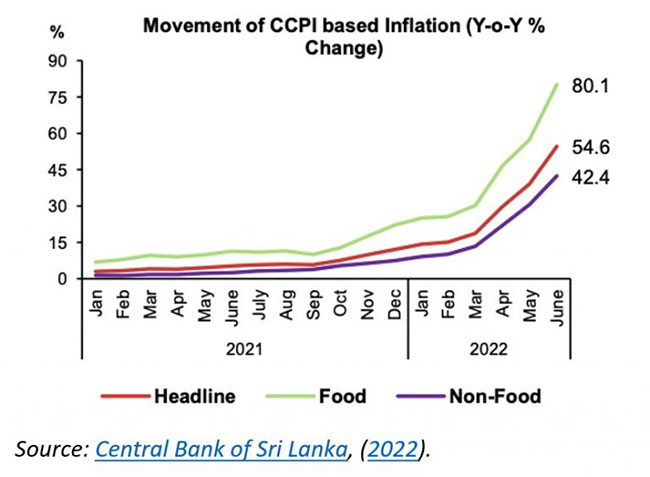Business
The Plight of the Poor

Sri Lanka’s Deepening Economic Crisis:
By Lakshila Wanigasinghe
 Empty supermarket shelves, endless queues to buy essentials and overnight camping around fuel stations are now regular sights in Sri Lanka. As the economy continues to plummet with no viable short-term solutions in sight, levels of frustration among the citizens continue to rise.
Empty supermarket shelves, endless queues to buy essentials and overnight camping around fuel stations are now regular sights in Sri Lanka. As the economy continues to plummet with no viable short-term solutions in sight, levels of frustration among the citizens continue to rise.
The country’s worst economic crisis since independence has battered Sri Lankans from all walks of life but the fallouts are impacting the poor with greater intensity. If urgent measures are not taken to support the most vulnerable at this time, more Sri Lankans will slip into poverty thus increasing intergenerational poverty in the long term. This blog identifies some of the most pressing challenges faced by the poor and vulnerable amidst the prevailing crisis and outlines policy options to safeguard their well-being.
Background
Sri Lanka’s current economic crisis is a result of several years of mismanagement, corruption, shortsighted policymaking, and an overall lack of good governance. Insufficient foreign reserves at Sri Lanka’s Central Bank and loss of access to international capital markets resulted in the country defaulting on debt for the first time in history. Unchecked external borrowings, tax cuts that widened the existing budget deficit, the chemical fertiliser imports ban and the sudden floating of the Sri Lankan rupee are among several factors that contributed to the economic collapse. Tourism, together with apparel and tea exports – some of Sri Lanka’s main income sources – were affected in recent years due to various internal and external factors such as the 2019 Easter Sunday attacks followed by COVID-19 in 2020. Now, the economic crisis presents multiple challenges including severe threats to nutrition, food security, healthcare, and education.
Impacts on the Vulnerable
The rapid depreciation of the Sri Lankan Rupee and the inability of wages to keep up with inflation have drastically lowered the standard of living. Inflation, as measured by the Colombo Consumer Price Index (CCPI) for June 2022, was 54.6% in comparison to 39.1% in the previous month. Further, food inflation rose to an alarming 80.1% in June 2022.
The ability to earn a living wage is hampered by insufficient fuel supplies. This along with the rise in transport costs and overcrowded public transport have left workers struggling to commute to work. Daily wage earners such as three-wheel drivers are in fuel queues for days losing out on productive work hours. Regular interruptions to the power supply are affecting small-business owners’ ability to conduct business and with many completely shutting down operations. Shortages in gas and kerosene oil for cooking, rise in commodity prices and supply shortages are changing people’s consumption patterns forcing many families to reduce their consumption and non-consumption expenditure. The inability to receive adequate nutrition due to increases in the cost of living is affecting children’s health and may lead to increased rates of malnutrition in the future. Apart from this, continuous school closures are impeding children’s education, especially at the village level where most families lack the technology for digital learning.
Short-term Relief
Sri Lanka was facing a reversal in poverty levels since the COVID-19 pandemic and faces the risk of many new groups following suit along with those who are already poor falling deeper into poverty. Hence immediate measures must be taken to support the poor and ensure their livelihood sustenance to some extent. As the current fiscal restrictions pose a challenge in supporting all groups in need, emergency relief efforts need to be targeted toward the most vulnerable so as to not further cripple the economy. Providing cash transfers is one such relief option. They were widely popular as a global emergency response during COVID-19. While Sri Lanka also adopted this as a response to the pandemic, the key in this context would be to provide an adequate sum of money to the most deserving households. Although this may include a considerably large number of at-risk families due to rising inflationary pressure, unfortunately only those in dire need of support must be beneficiaries at this time. As such authorities will have to make tough choices to correctly identify deserving households. Financing these cash transfers will require an allocation of a portion of funds from foreign aid, loans and other humanitarian assistance received by Sri Lanka.
Following the declaration of a three-day weekend for public sector employees, primarily to utilise their time to cultivate consumable crops at the household level, the provision of in-kind support such as seeds and fertiliser for cultivation is another option. As with monetary support, these initiatives must be targeted toward the poorest who are unable to meet their required nutrition levels. However, there is an issue with such families not having suitable plots of land for cultivation. Thus, initiatives need to be thought of on how to overcome space limitations. One option is through community gardens which can be introduced in village-level Grama Seva offices, school grounds etc. Proper organisation, allocation, and monitoring are imperative to successfully execute these initiatives.
Although an unpopular solution, temporary rationing measures will need to be put in place, especially for high-demand commodities such as fuel, gas, milk powder and medicine etc. This will help curb excess purchasing of items and ensure all individuals have access to purchase necessities. Excessive purchasing often leaves the poor on the losing end since they do not have sufficient funds to purchase beyond their immediate requirements. Hence rationing will help with maintaining sufficient supplies for low-income groups such as daily-wage earners. While it is important to support the poor and vulnerable at this time, it is imperative to ensure the limited fiscal and other resources are used effectively. Further, these measures need to be taken alongside working towards ensuring political stability and debt sustainability to restore international confidence in Sri Lanka. This will encourage support from the global community to help Sri Lanka work towards overcoming this crisis.
Link to the full blog – https://www.ips.lk/talkingeconomics/2022/07/18/sri-lankas-deepening-economic-crisis-the-plight-of-the-poor/
Lakshila Wanigasinghe is a Research Officer at IPS with research interests in poverty, social welfare, development, education, and health. She holds an MSc in Economics with a concentration in Development Economics and a BA in Economics with concentrations in International, Financial and Law and Economics from Southern Illinois University Carbondale (SIUC), US. (Talk with Lakshila – lakshila@ips.lk)
Business
AHK Sri Lanka champions first-ever Sri Lankan delegation at Drupa 2024

The Delegation of German Industry and Commerce in Sri Lanka (AHK Sri Lanka) proudly facilitated the first-ever Sri Lankan delegation’s participation at Drupa 2024, the world’s largest trade fair for the printing industry and technology. Held after an eight-year hiatus, Drupa 2024 was a landmark event, marking significant advancements and opportunities in the global printing industry.
AHK Sri Lanka played a pivotal role in organising and supporting the delegation, which comprised 17 members from the Sri Lanka Association for Printers (SLAP), representing eight companies from the commercial, newspaper, stationery printing, and packaging industries. This pioneering effort by AHK Sri Lanka not only showcased the diverse capabilities of Sri Lanka’s printing sector but also facilitated vital bilateral discussions with key stakeholders from the German printing industry.
Business
Unveiling Ayugiri: Browns Hotels & Resorts sets the stage for a new era in luxury Ayurveda Wellness

In a captivating reimagining of luxury wellness tourism, Browns Hotels & Resorts proudly unveiled the exquisite Ayugiri Ayurveda Wellness Resort Sigiriya. This momentous occasion, celebrated amidst a vibrant and serene grand opening on the 6th of June, heralds a new chapter in the Ayurveda wellness tourism landscape in Sri Lanka. Nestled amidst 54 acres of unspoiled natural splendour, Ayugiri features 22 exclusive suites and stands out as the only luxury Ayurveda wellness resort in the country offering plunge pools in every room, rendering it truly one-of-a-kind.
The grand opening of Ayugiri Ayurveda Wellness Resort was an enchanting event, where guests were captivated by the melodies of flutists and violinists resonating through Sigiriya’s lush landscapes. As traditional drummers and dancers infused the air with vibrant energy, Browns Hotels & Resorts’ CEO, Eksath Wijeratne, Kotaro Katsuki, Acting Ambassador for the Embassy of Japan and General Manager, Buwaneka Bandara, unveiled the resort’s new logo, marking a significant moment witnessed by distinguished guests from the French Embassy, Ayurveda and wellness enthusiasts along with officials from the Sigiriya area, LOLC Holdings and Browns Group.
“Our strategic expansion into wellness tourism with Ayugiri Ayurveda Wellness Resort Sigiriya symbolises a significant milestone for Browns Hotels & Resorts. Wellness tourism has consistently outperformed the overall tourism industry for over a decade, reflecting a growing global interest in travel that goes beyond leisure to offer rejuvenation and holistic well-being. By integrating the timeless wisdom of Ayurveda with modern luxury, we aim to set a new standard in luxury wellness tourism in Sri Lanka. Whether your goal is prevention, healing, or a deeper connection to inner harmony, Ayugiri offers a sanctuary for holistic well-being” stated Eksath Wijeratne.
Ayugiri encapsulates the essence of life, inspired by the lotus flower held by the graceful queens of the infamous Sigiriya frescoes. Just as the lotus emerges from the murky depths, untainted and serene,
Ayugiri invites guests on a journey of purity and rejuvenation, harmonised with a balance of mind, body and spirit, the essence of nature, echoes of culture and the wisdom of ancient Ayurvedic healing.
Business
HNB General Insurance recognized as Best General Bancassurance Provider in Sri Lanka 2024

HNB General Insurance, one of Sri Lanka’s leading general insurance providers, has been honored as the Best General Bancassurance Provider in Sri Lanka 2024 by the prestigious Global Banking and Finance Review – UK.
The esteemed accolade underscores HNB General Insurance’s unwavering commitment to excellence and its outstanding performance in the field of bancassurance. Through dedication and hard work, the HNB General Insurance team has continuously endeavored to deliver innovative insurance solutions, cultivate strong relationships with banking partners, and provide unparalleled service to customers nationwide. This recognition is a testament to the team’s dedication and relentless pursuit of excellence in the bancassurance business.
“We are honored to receive this prestigious award, which reflects our team’s tireless efforts and dedication to delivering value-added insurance solutions and exceptional service through our bancassurance partnerships,” said Sithumina Jayasundara, CEO of HNB General Insurance. “This recognition reaffirms our position as a trusted insurance provider in Sri Lanka and motivates us to continue striving for excellence in serving our customers and communities.”












